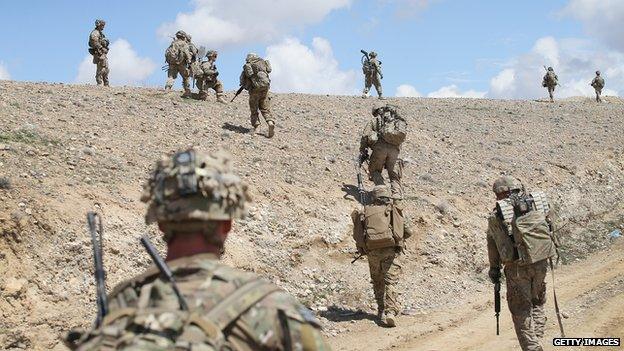Can social media cause PTSD?
- Published

Post-traumatic stress disorder is most commonly associated with soldiers in war - but could similar symptoms be caused simply by watching videos online?
A recent study hit the headlines when it found that some social media users could develop the symptoms of post-traumatic stress disorder (PTSD) by viewing violent or disturbing content. Should we be worried?
The headlines were stark: "Online videos can cause post-traumatic stress disorder, external" one said, while another announced: "Social media users 'traumatised', external".
The controversial suggestion was that watching gruesome videos and images online at home could lead to the same types of symptoms most associated with combat veterans.
The stories were triggered by a study released earlier this month, external by Dr Pam Ramsden, a researcher at the University of Bradford. Ramsden surveyed 189 people about their reactions to a range of events. She found that more than a fifth of respondents scored high on clinical measures of PTSD from seeing pictures on social media - even though they hadn't experienced the traumatic events first-hand.
While the study didn't definitively diagnose any of the respondents, and has not yet undergone peer review, Ramsden says the results were clear. She told BBC Trending: "If a particular person who scored high on the scale [used in the study] came into a GP's office, we could easily diagnose them with PTSD, because they have the same symptoms."
PTSD can develop in some people after exposure to major stress. Most often associated with combat veterans, it became part of the medical lexicon starting in the 1980s, although elements of PTSD have been identified throughout history - even in antiquity.
To be diagnosed with the disorder, symptoms - which include flashbacks, avoidance, sleep disturbances and mood changes - must continue for more than a month after the traumatic event. To the untrained observer the idea of second-hand or "vicarious" PTSD might sound incredible. How could someone who merely watches events on a screen suffer the same problems as, for instance, a combat veteran?
When BBC Trending broached the subject on an online message board devoted to PTSD, some respondents said they were offended by the suggestion that the disorder could be triggered just by watching online videos.

For more info about post-traumatic stress disorder:
- there's this primer from BBC News
- and more information from the National Health Service, external and US National Institute of Mental Health, external

But Walter Busuttil of veterans' mental health charity Combat Stress says vicarious PTSD is a well-established phenomenon.
"There is a level of resilience that may be very high in some people and very low in others, and social media may actually affect particularly vulnerable people," he says. "I always tell my patients it's not a competition. We don't say that anyone's got anything more severe than anyone else."
"This study is not saying that people develop PTSD," he noted. "This study is saying that we can detect some symptoms that are measurable that are similar to PTSD."
The DSM-5, the main diagnostic manual of the American Psychiatric Association, external, includes a classification of vicarious PTSD for workers - such as police officers or journalists - who might routinely be exposed to disturbing online videos because of their jobs. Major news organisations, including the BBC, regularly warn journalists about the effects of repeated viewing of violent or disturbing events, and regularly flag up potentially disturbing content online.
But ordinary internet users usually don't have those same protections. Ramsden has done several studies in this area and admits her research has thrown up some controversial findings. But she says that the proportion of her research subjects who have experienced stress after viewing disturbing images has remained consistent, and points out that social media lacks the same context as traditional broadcasts.
"On television or even on the radio, you get a warning: 'The following story could be disturbing'. You don't get that kind of warning on social media," she says. "Now everything is on YouTube, and things that we don't necessarily even pick up on are being viewed millions of times - car accidents, all kinds of disturbing things."
"We really can't censor those things, and I'm not for censorship. What I'm saying is that people need to be aware that those images can cause disturbances or add to life stress," she says. "In the same way that if you eat fast food all the time, it's going to be bad for your health. In the same way, if we're viewing violent images all the time, I believe it can have a significant impact on our mental health."
One key risk factor which might trigger PTSD symptoms is repeated viewing - in other words, people who unwittingly stumble upon violent content are highly unlikely to develop long-term problems. And there are very good therapies to treat PTSD even long after the traumatic events have occurred, according to Busuttil. The bottom line, experts say, is that if you have or think you have PTSD symptoms, it's important to seek help from your doctor.
Blog by Mike Wendling, external
Next story: They begged their heroes to come - but will they listen?
Follow BBC Trending on Twitter @BBCtrending, external, and find us on Facebook, external.